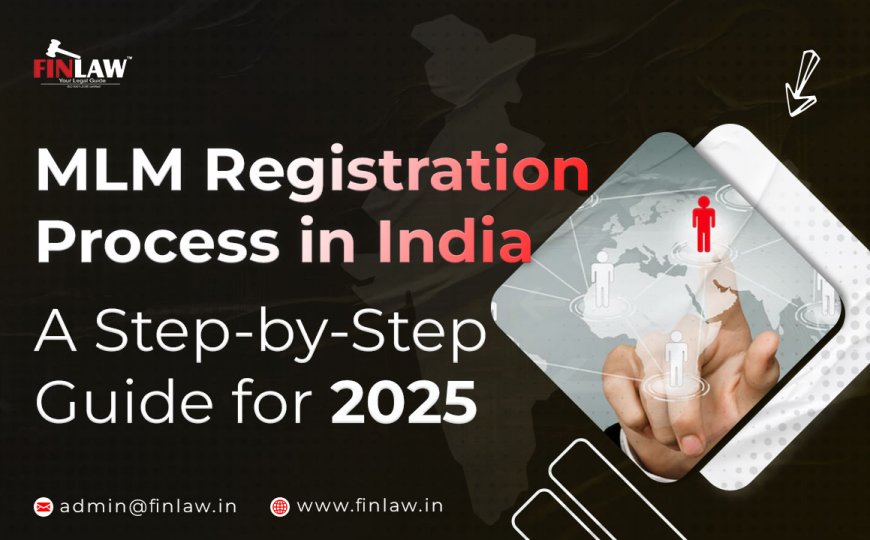MLM Registration Process in India: A Complete Step-by-Step Guide for 2025
Step-by-step guide to the MLM registration process in India for 2025. Learn legal requirements, compliance rules & how to start your MLM business.

Multi-Level Marketing (MLM), also known as network marketing or direct selling, is a business model where independent distributors earn commissions by selling products and recruiting new members. In India, MLM is a popular model for health supplements, cosmetics, home care products, kitchenware, educational services, and even certain tech-based products.
However, since the Consumer Protection (Direct Selling) Rules, 2021, running an MLM business is no longer as simple as just launching a product and signing up distributors. You must follow a structured MLM registration process in India to operate legally, protect your distributors, and avoid being classified as an illegal pyramid scheme.
Why MLM Registration is Essential in India
Before 2021, MLM companies operated in a regulatory grey area. While the Prize Chits and Money Circulation Schemes (Banning) Act, 1978 prohibited pyramid and money circulation schemes, there was no dedicated compliance framework for direct selling.
That changed with the Consumer Protection (Direct Selling) Rules, 2021 and subsequent clarifications by the Department of Consumer Affairs. These rules make it mandatory for any MLM or direct selling entity to:
-
Be a registered legal entity in India (Company/LLP/Partnership).
-
Maintain transparency in product pricing and commissions.
-
Have clear grievance redressal mechanisms.
-
Avoid misleading income or product claims.
-
Submit to consumer protection oversight.
Failure to comply can result in fines, seizure of assets, and even criminal prosecution under the Consumer Protection Act, 2019.
Step-by-Step: MLM Registration Process in India (2025 Updated)
1. Select a Legal Business Structure
For MLM company registration in India, most promoters opt for a Private Limited Company due to credibility, limited liability, and ease of compliance.
Other options include Limited Liability Partnership (LLP) or Partnership Firm, but all must be registered with the Ministry of Corporate Affairs (MCA).
Tips:
-
Clearly mention “direct selling” or “MLM” in your company’s objectives in the Memorandum of Association (MOA).
-
Choose a business name that reflects your brand and complies with MCA naming guidelines.
2. Obtain Mandatory Registrations
Before starting operations, your MLM company must have:
-
PAN (Permanent Account Number) for taxation.
-
TAN (Tax Deduction and Collection Account Number) if TDS applies.
-
GST Registration for invoicing and tax compliance.
-
IEC (Importer Exporter Code) if you deal with cross-border products.
These documents are non-negotiable in the MLM registration process in India.
3. DPIIT Registration
The Direct Selling Rules encourage registering with the Department for Promotion of Industry and Internal Trade (DPIIT) to obtain an official registration/allotment number. This number must be displayed on your official website, marketing material, and invoices.
4. Registered Office & Officer Appointments
-
You must have at least one registered office in India.
-
Appoint:
-
Nodal Officer (to ensure compliance).
-
Grievance Redressal Officer (to handle consumer complaints).
Contact details of these officers must be published on your company website.
5. Draft Distributor Agreements & Company Policies
The Direct Selling Rules mandate a written contract with each direct seller/distributor. This should include:
-
Commission structure.
-
Return & refund policy.
-
Termination clauses.
Also publish:
-
Privacy Policy (data protection).
-
Earnings Disclaimer (to avoid misleading claims).
-
Compensation Plan (clear and transparent).
6. Set Up a Grievance Redressal System
Your MLM must:
-
Provide a 24×7 complaint filing option via email or website.
-
Acknowledge complaints within 48 hours.
-
Resolve issues within 30 days.
-
Be registered with the National Consumer Helpline (NCH).
7. Maintain Statutory Records
At your registered office, you must maintain:
-
Incorporation documents (COI, MOA, AOA).
-
PAN, TAN, GST certificates and returns.
-
Annual financial statements.
-
A register of direct sellers with verified identity proof.
-
Distributor contracts.
8. Product Licensing & Intellectual Property
-
Register your brand name/trademark.
-
Obtain FSSAI licence for food products, or cosmetic/drug licences if applicable.
-
Ensure all products comply with BIS standards where relevant.
9. Compensation Plan Compliance
Your MLM plan must:
-
Reward sales to end consumers, not just recruitment.
-
Avoid entry fees without product/service delivery.
-
Be reviewed by a legal professional to ensure it does not violate the Prize Chits and Money Circulation Schemes (Banning) Act, 1978.
10. Comply with Advertising & E-Commerce Rules
-
Avoid exaggerated claims (“earn ₹1 lakh in a week”).
-
Display company name, address, and registration details on every page of your website.
-
If selling online, follow the Consumer Protection (E-Commerce) Rules, 2020.
Estimated Timeline for MLM Registration in India
|
Step |
Timeframe |
|
Company Incorporation |
1–3 weeks |
|
PAN/TAN/GST |
1–2 weeks |
|
DPIIT Registration |
Variable (usually 2–4 weeks) |
|
Product Licences |
2–8 weeks |
|
Website & Policy Setup |
2–4 weeks |
Penalties for Non-Compliance
If you operate without following the MLM registration process in India:
-
Fines up to ₹10 lakh for first offence under the Consumer Protection Act.
-
Imprisonment up to 2 years for repeated offences.
-
Closure of operations by regulatory authorities.
FAQs on MLM Registration Process in India
Q1: How to register an MLM company in India?
Incorporate your business with the MCA, obtain PAN/TAN/GST, register with DPIIT, appoint officers, draft agreements, and set up grievance redressal as per the Direct Selling Rules.
Q2: Is MLM legal in India?
Yes — MLM is legal if it sells genuine products, follows the Direct Selling Rules, and does not operate as a pyramid scheme.
Q3: Do I need a special MLM license?
No specific licence exists, but multiple registrations and compliance requirements must be met.
Q4: Can a foreign MLM operate in India?
Yes, but it must have a registered office in India and comply with Indian laws.
Q5: What are examples of legal MLM companies in India?
Companies like Amway, Herbalife, Oriflame, Modicare operate under the direct selling framework and comply with Indian rules.
Final Checklist for MLM Registration in India
-
Choose business structure & register with MCA.
-
Obtain PAN, TAN, GST (IEC if needed).
-
Register with DPIIT.
-
Appoint Nodal & Grievance Officers.
-
Draft distributor agreements & publish policies.
-
Set up grievance redressal & NCH registration.
-
Maintain statutory records.
-
Get product licences & trademark.
-
Legally vet compensation plan.
-
Ensure website & advertising compliance.
Conclusion
The MLM registration process in India in 2025 is more regulated than ever before. While the process requires multiple steps — from company incorporation to product licensing — the payoff is long-term sustainability, legal protection, and consumer trust.
If you structure your MLM right, maintain compliance, and focus on genuine sales rather than recruitment, your business can thrive without the shadow of legal trouble.
What's Your Reaction?



















